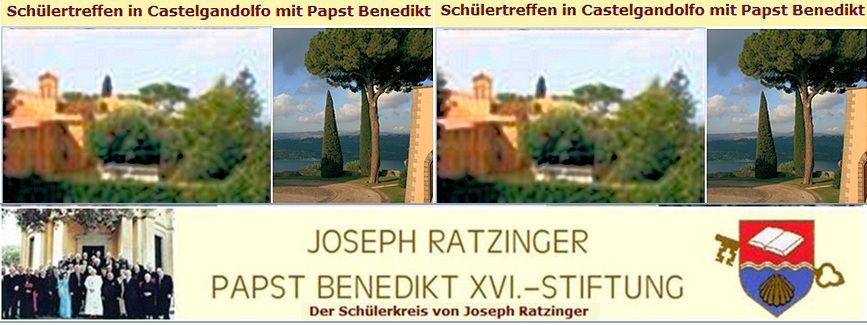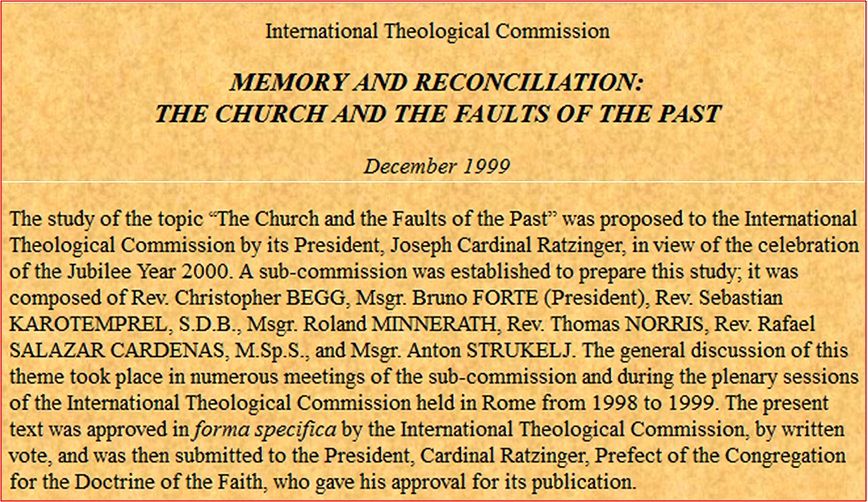
 On the 5th centenary of the Reformation:
On the 5th centenary of the Reformation:
Will Catholics and Protestants
exchange 'mea culpa' for offenses
committed on both sides?
Translated and adapted from the Italian service of

Sept. 4, 2012
There is an idea being whispered about in Rome, but it is something that has been well rooted in the German-speaking world, especially after Pope Benedict XVI's visit to Germany last year, when he tailored his program to focus more on Catholic relations with the Lutherans, indicating a desire for more than just ecumenical dialog.
And so, in the aftermath of the Ratzinger Schuelerkreis's 2012 seminar in Castel Gandolfo, a remark made to Vatican Radio by Fr. Stephan Horn, president of the Schuelerkreis, caught a lot of attention.
He said that in the context of the seminar theme on ecumenical questions in the dialog with Lutherans and Anglicans, the seminar participants discussed the forthcoming fifth centenary of the Reformation in 2017, and that it could feature a mutual 'mea culpa' on the part of Catholics and Protestants "to drain away old poisons and bring spiritual peace after long conflict".
"The Holy Father has always thought that a purification of memory was necessary in this respect," Horn said. "History cannot be annulled, but its interpretation can be changed, the way facts are judged." He said historians agree about this, especially those who have studied the Council of Trent, which launched the Counter-Reformation.
Many initiatives have already been programmed for 2017, he pointed out, but this reciprocal 'mea culpa' could be the crowning feature, and one that would be fittingly realized under a German Pope.
Let it not be forgotten that in 1999, Cardinal Joseph Ratzinger, as Prefect of the Congregation for the Doctrine of the Faith, asked the International Theological Commission to lay down the theological groundwork for the 'purification of memory' that John Paul II intended be a major feature of the Jubilee Year celebrations of 2000, closing the second millennium of Christianity.
 From the Introduction:
From the Introduction:
The Bull of Indiction of the Great Jubilee of the Year 2000, Incarnationis mysterium (November 29, 1998), includes the purification of memory among the signs “which may help people to live the exceptional grace of the Jubilee with greater fervor.”
This purification aims at liberating personal and communal conscience from all forms of resentment and violence that are the legacy of past faults, through a renewed historical and theological evaluation of such events.
This should lead - if done correctly - to a corresponding recognition of guilt and contribute to the path of reconciliation. Such a process can have a significant effect on the present, precisely because the consequences of past faults still make themselves felt and can persist as tensions in the present.
The purification of memory is thus “an act of courage and humility in recognizing the wrongs done by those who have borne or bear the name of Christian.”
It is based on the conviction that because of “the bond which unites us to one another in the Mystical Body, all of us, though not personally responsible and without encroaching on the judgement of God, who alone knows every heart, bear the burden of the errors and faults of those who have gone before us.”
John Paul II adds: “As the successor of Peter, I ask that in this year of mercy the Church, strong in the holiness which she receives from her Lord, should kneel before God and implore forgiveness for the past and present sins of her sons and daughters.”
In reiterating that “Christians are invited to acknowledge, before God and before those offended by their actions, the faults which they have committed,” the Pope concludes, “Let them do so without seeking anything in return, but strengthened only by ‘the love of God which has been poured into our hearts’(Rom 5:5).”
The actual prayers for forgiveness led by John Paul II in the liturgy of March 12, 2000, and the causes for which forgiveness was sought, maybe found on
http://www.sacredheart.edu/pages/12654_pope_john_paul_ii_asks_for_forgiveness_march_12_2000_.cfm
Cardinal Ratzinger led the second prayer regarding the confession of sins committed in the service of the truth:
Let us pray that each one of us, looking to the Lord Jesus, meek and humble of heart, will recognize that even men of the Church, in the name of faith and morals, have sometimes used methods not in keeping with the Gospel in the solemn duty of defending the truth.
I suppose in view of the most notorious crimes of the medieval Inquisition (which was not all evil, BTW), it was appropriate that this particular prayer was led by the Prefect of the successor office to the Holy Office of the Inquisition.
[Modificato da TERESA BENEDETTA 05/09/2012 03:31]